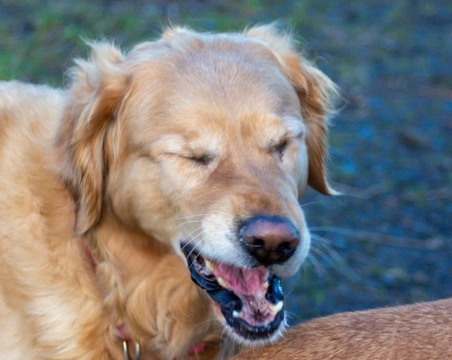
Why is my dog sneezing?
All dogs are apt to sneeze once or twice now and then just as we humans are; and while we often think “uh oh, cold on the way!” Sneezing is just one of those things that often, doesn’t really mean anything other than that something irritated your nose for a second.
However, if your dog is undergoing a protracted bout of sneezing or seems to sneeze often, it is important to find out what is going on.
This article will outline the most common causes of sneezing in dogs. Read on to learn more.
Allergies
Allergies come in all manner of forms, both in terms of the symptoms they cause in dogs and what your dog might be allergic to in the first place.
Most of us think of sneezing as being the number one allergy symptom in dogs, and it is probably one of the most common, but not all canine allergies cause sneezing. For instance, many food allergies result in digestive symptoms and skin issues, with no sneezing involved.
That said, allergies are one of the most common causes of sneezing in dogs nonetheless.
Respiratory infections
Respiratory infections in dogs aren’t quite as common as they are in people, but they’re something that many dogs get from time to time nonetheless.
We tend to think of coughs and colds in people being caused mainly by viruses or bacteria, but in dogs, a good proportion of all respiratory infections are fungal in nature.
Viral and bacterial respiratory infections in dogs are more likely to result in coughing than sneezing, although this is not a firm rule, but a fungal respiratory tract infection in your dog is very likely to make them sneeze. A common culprit of this is aspergillus fungus, which can cause an infection called aspergillosis.
This can cause a range of symptoms including the sneezing and also a nasal discharge, potential inflammation, and even intermittent nose bleeds.
Aspergillosis in dogs can be serious when advanced, so contact your vet as soon as you can if your dog displays symptoms like these.
Nasal mites
Nasal mites in dogs are far less common than ear mites, but if your dog does have nasal mites, they’re highly likely to be sneezing a lot, as the mites continually irritate the inside of your dog’s nose.
Dogs can catch nasal mites from each other or from infected earth, and while they’re very easy to spread, they’re not hugely widespread in the UK in the first place.
Again, as well as the sneezing, nasal mites in dogs can cause a discharge from the nose, and even nosebleeds, so contact your vet to get a formal diagnosis and resolve the issue.
They’ve inhaled something
When kids get something stuck up their nose it is almost universally because they willingly, if inexplicably, decided to put it there! Dogs, on the other hand, can easily and inadvertently inhale something that gets stuck, irritates the inside of their nose, and makes them sneeze.
This could be anything from a bit of fluff to a grass seed, but while it remains inside of your dog’s nose without either being propelled back out again (which vigorous sneezing can often achieve) or inhaled fully, it will be very annoying.
Play sneezing
Play sneezing or social sneezing in dogs is a behaviour most dog owners have witnessed without actually knowing what they were seeing.
This happens when a dog is socialising with another dog, and they’re having fun or really excited. The sneeze itself is a form of communication signal that lets the other dog know that the sneezer is having great fun, but we’re fairly sure the sneezer themselves doesn’t have any physical control over this reflex.
Not all dogs play-sneeze, but if you keep an eye out, you may see it is more common than you think; and some dogs, particularly puppies, even exhibit this behaviour when playing with people.
Dental issues
Bad dentition in one specific situation can actually cause a dog to sneeze, and this might seem like such a weird combination of cause and effect that some dog owners will no doubt have just read that line twice!
What’s the deal? Well, if a dog has a rotting or infected tooth next to their third upper premolar, or even if this tooth itself is causing a problem, this specifically (and not other teeth) can cause a dog to sneeze.
This is because the roots of the third upper premolar run really near to the dog’s nasal passages, and this can be enough to trigger the irritation reflex that results in a sneeze.
Nasal growths
If your dog has a growth anywhere between the inside of their nostrils through to the end of their nasal passage, this can cause persistent sneezing. Said growth could be anything from a spot or ingrown nasal hair to a harmless polyp to a cancerous growth.
If your vet can’t get to the bottom of your dog’s sneezing by exploring other options, they’ll probably want to take some scans to check for a growth.
Nasal passage tumours in dogs are more common in dogs with very long noses (like
) and in dogs that have been exposed long-term to passive smoking.



